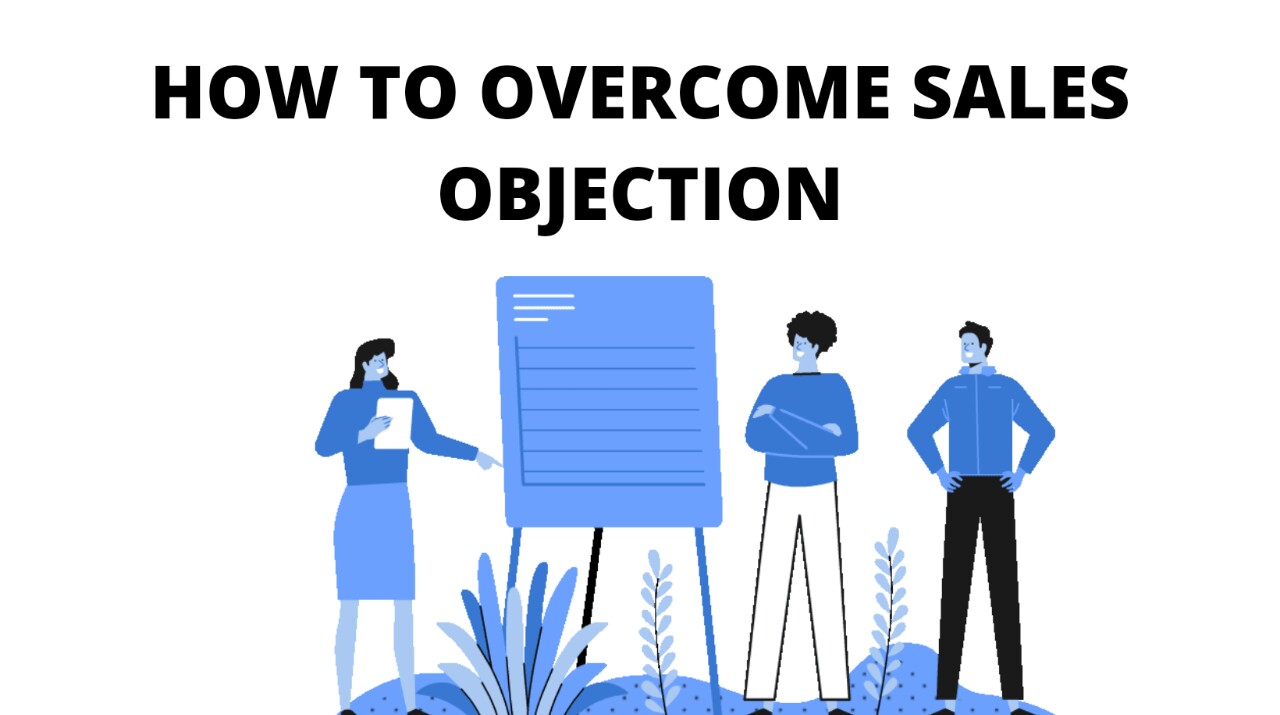
What do you think of first when you hear the term ‘objection?’ A blank straight NO is what pops in our mind. The expression ‘sales objection’ is used when there is a barrier between the buyer and what you offer. To put it in simple terms, a sales objection is when the buyer is dissatisfied with the product and does not want to buy it. But do not lose hope when the buyer doesn’t agree to buy the product. It is a universal rule that there is no way your journey as a salesperson will be filled with statements like “I hope to do more business with you” or “Yes, I love this offer, and I agree to it .”There will always be buyers who you will have a tough time convincing. The salesperson’s journey is filled with highs and lows and obvious objections.
Objections can reach you in many forms. You might have experienced situations where people like your product, but they don’t think it will work for them, or they have been in talks with other providers to buy the same product. Still, they would have told you that your product is at least 20% higher than what others offer, or they might have even told you that they don’t want to invest in a product due to their budget constraints. If you want to be great at sales, you have to overcome objections. Overcoming an objection depends on your mindset, which will bring about a difference in gaining new customers.
Imagine this, you have perfect plans and well-designed aspects of selling your product, and you think there is no way your buyer won’t like the product. So you confidently dial them on the phone, maybe you might have little to no connection with the buyer, but you are hopeful in what you are offering. But then they reject your offer. Now that you are confronted with a sales objection, you might think of giving up your job as a salesperson. But truth to be told, the role of a salesperson is to understand what might have made the buyer reject your offer, what are the ways that you need to improve and work on to ensure that you try to limit the sales objection as much as possible. In your whole career as a salesperson, it is no way guaranteed that you will never face any sales objection. The key here is to overcome objections, and you might have it sorted as you gain more experience as a salesperson. It just takes time to reach that level, but it is possible.
THE COMMON TYPES OF OBJECTIONS YOU MIGHT DEAL WITH
You may have successful sales when the product or service you offer would have fit their budget, you might have successfully been able to convince them, or maybe actually the timing was right. This is now popularly referred to as BANT, which stands for Budget, Authority, Need, and Timing. Thinking and carefully planning in regards to BANT is essential to your success.
BANT also explains the reason for sales objection:
1. Lack of Budget
“The product is too expensive .”This might be one of the main reasons for sales objection. Being a salesperson, you need to ensure that the buyer understands that the product you offer is completely worth the value. By providing them a valid reason to overcome their worries about budget, you will convince them that the product will be rewardful.
2. Lack of Trust
“The company doesn’t tell anything about this .”People like to be in a business partnership with those they can trust. When you have an inbound sales conversation about overcoming the sales objection, you have to tell your buyer about your product and go over everything they would benefit from if they bought your product. To gain their trust, you have to build a connection with them and make them realize your authority in the company.
3. Lack of Need
“I don’t think that this product will be useful to me .”Though you are bound to think that this is a straightforward objection, you might use this opportunity to give information about your product and also gain information about what their needs are. You can have an open-ended conversation to understand your buyer’s needs.
4. Lack of Urgency
“This is not important to me right now .”When your buyer tells you this, you need to realize if the problem is timing or if the buyer doesn’t want to have a sales partnership with you. One way to overcome this is by asking what they prioritize now and why they consider it unimportant. If their answers are vague, then you might get the hint.
So if this all fails, even though you are meticulous in planning regarding the buyer’s needs, then fix an appointment with them and look into the issue later.
WAYS TO DEAL WITH THE COMMON OBJECTION “THE LACK OF BUDGET”
The above-mentioned four-step approach is really helpful in overcoming the sales objection. But for now, let’s focus on the most common objection – money.
Strategies to Reply to the Lack of Budget Objections
To overcome objections based on money, have the following in mind before talking to your buyer:
- Choose your words carefully – You might consider saying to them, “Our product is worth every penny you pay” or “You get the best deal for what you are paying .”But don’t say this. Never. This might come across as a very insincere statement.
- Not everything is about money – Ask questions if money is the actual issue for the sales objection. Learn to uncover the actual reason behind their disapproval.
- Now talk about the value – Before you talk to your prospect about the product’s value, make sure you have a clear idea about what information you are sharing with them. If you offer them value and it fits the buyer’s needs, they might approve it. But in some cases, the buyers might say, “The price is too high,” which may mean that they don’t need it no matter what you offer them the clear picture of the value.
- Ask them, “Which part don’t they prefer?” – While asking this make sure you review every component of your product. And while you do so, the buyer might buy our product with the reduced component or maybe find the value in buying the entire product.
- Don’t discuss the cost or drop the price – You should never consider justifying the price, or there might be a downfall. If you want to lower the price of the product, you are, in a way, telling the buyer that this is how a salesperson operates. Instead of doing this, trade the product for its value.
- Maintain a good relationship – Having an amicable relationship might make your work easier. Don’t look for your organization’s permission when such a demanding situation arises.
- Make sure you are having talks with the decision-maker – There are chances you might be dealing with a buyer who doesn’t want to make an economic decision or someone who isn’t in a position to make decisions. In such cases, the card they pull out is money because they can’t decide to buy even if they want to.
6 Types of ‘Lack of Budget’ Objections
Objections based on money can come in different flavours, and each time they have a different meaning. Here are the six money based common objections and how they sound and what they mean:
1. Strike Back
What the buyer tells you: “Woah, it is quite a lot. How about we do it for less?”
What they mean: This buyer might probably be someone who always asks for price reduction and has achieved what they want. Their policy is that it does not sting to ask for price reduction once.
2. Bluffing
What the buyer tells you: “I don’t have enough money. Can we do this deal for less?”
What they mean: This buyer has money, but they use this as an excuse to see if you reduce the costs.
3. Value Challenge
What the buyer tells you: “This product is costly. Money will be a problem.”
What they mean: The buyer doesn’t notice the value of your product. Hence they are apprehensive about spending money on buying the product.
4. Budget Pushback
What the buyer tells you: “It is not in my budget.”
What they mean: Indeed, it is not in their budget, but they are willing to see if you can work out the costs. Or it may be true, and they are using that claim to bargain the rates. It sometimes may not be true, but the buyer is just saying it.
5. Competitor Pressure
What the buyer tells you: “I have received offers from others too, but your price is the highest.”
What they mean: This might be true, and they are using it to bargain for the costs. Or this claim may not be true, or at least it is not the entire truth.
6. We are Done
What the buyer tells you: “It is too much money. Call me if you are considering lowering the price.”
What they mean: They probably assume that you will return with a lowered price. Or they are probably thinking, how far you are willing to lower the price.
If you are dealing with money-based objections, it is advised that you follow the mentioned strategies.
SOME OTHER SPECIFIC OBJECTIONS YOU MIGHT FACE
- I can’t buy it now because of COVID-19
This might be one of the common objections you may have heard during the pandemic. So how do you think of handling this situation? If you are pushing your product for business even now, you might come off as a pushy person.
How to handle this?
One solution to this problem is hearing what they are saying and their objection. Be honest with your buyer about how the pandemic has affected your company and you too. Your buyer probably doesn’t want to buy the product right away, but they may be willing to buy it later. Listen to them and tell them about the things that need to happen for the business to return to the normal situation, like:
- The economy’s reopening
- People returning to work at offices
- Less infection rate
This way, get a list of priorities and ask which is important to them. Depending on their answer, be in constant touch with them by sending updates on the metrics. Soon when they realize things are getting better, they will be able to purchase.
They might not keep track of all the metrics, so you have to be in touch with them. Bryce Sanders, the President at Perceptive Business Solutions, says, “Here’s my logic: ‘I’m not buying because now is not the right time.’ You simply ask them, ‘when will be the right time?’ or ‘how will you know?’ You want to be in touch with them, so you plan to track things together. If they do not want to buy and are not serious prospects, you will know.”
- “Remove me from the mailing list. I do not find your emails relevant to the current situation.”
If you look at it, it isn’t a sales objection. Your prospect is mostly saying this because your mail contains irrelevant information or insensitive or false information. But above all this, you need to understand that your prospect has never said they don’t want to buy the product. They are just telling you that the emails do not apply to their situation.
How to handle this?
This situation is quite different. The solution to this is a three-step process – Go back, evaluate and start anew with emailing. Mike Brooks of Mr. Inside Sales says, “Examine if your email is out of touch! Many sales reps and companies have not modified emails to the current situation. You might as well need to adapt to what is happening in the world right now.”
It has been many months since the COVID outbreak has hit the world. But some companies have still not modified the emails to fit the present situation. But that is fine, you can start changing it now, and it is pretty simple. Do the following if you are beginning to change the email:
- Send your buyers safety tips
- Check how they are doing
- Provide them tips that genuinely work
This shows that you are trying to be empathetic with them and build an honest relationship by being consistent in your communication.
- “I am happy with your product, but I can’t pay for it now.”
Ever since the pandemic, several businesses have been hit hard. Although the buyer is happy with your product, they might not have the budget to buy your product as their priority.
How to handle this?
This, again, is not an objection. If you read in between the lines, you might notice that the prospect is willing to pay but just not right now. Many software companies come up with trial periods these days. If your prospect is interested in buying, you can extend the trial period to avoid losing a potential customer.
Thomas Philip, the Senior Account Manager at Freshworks, says, “The strategy I use is, if the prospect is still using the trial version of the product, I extend their trial period by say, 2 months. The way I see it is, they are satisfied with the product. If they aren’t ready to pay now, they’ll pay later.”
Through this, Thomas says that being there with his prospects during their hard times will make them remember it for a long time. But there are a few products, which don’t have a trial period to offer. For example, you can’t offer a car from your showroom for a trial period. Instead of paying all the costs at once, many customers choose to pay monthly up to a certain period. Bryce Sanders says, “Some products have a trial period. In other cases, the paperwork is completed upfront, payments start after 60 days (which implies that) they “legally still owe the money.” In my opinion, two things need to happen. You need to get at least some money upfront (or) they need to sign paperwork legally binding them to pay later.”
- “We don’t have the bandwidth for this product”
When someone is transitioning to remote work, there should be a slow process that needs to be implemented over some time. Since you don’t benefit from meeting your co-workers, there is a chance of miscommunication happening as you don’t interact face-to-face.
How to handle this?
So to understand this situation first, you need to put yourself in their place. Be empathetic to their problems and assist them. And never let communication fade away between you and your prospect. Being in touch with the prospect is one of the most important things one should do as a salesperson. Go through the marketing content and share tips with them. If you don’t find any pertinent information, you can send articles relating to this. All you have to do is search Google.
If you want to step further, then make a quick call to discuss the tips with them. While you are on a call, make sure you only address the tips they might need. Once they feel that the solution matches their needs, introduce them to the product and show them how your product can help resolve their concerns. Thomas Philip, a Senior Account Manager at Freshworks, states, “If they are telling me that they are transitioning to remote work, I make sure the communication between us doesn’t die down. I usually send them emails offering tips on easy transitioning to remote work. In the same email, I will ask them if we can have a quick chat to discuss the tips. I hold this belief that we should position ourselves as someone who is a solution expert, rather than just being a sales rep during these times.”
This method gives you a low-key opportunity to show them how the product works, and thereby eventually, you can make a sale too.
- “We are not in a good financial position now”
To respond to this sales objection, you need to look back, analyze the situation, and not give up on being in terms with the prospect. Ask what you can do and what value can you add to it.
How to handle this?
First of all, make sure you research the company when your prospect uses this objection. If you think that they are genuinely hurt financially, then consider offering a discount to them. Offering a discount may depend on the market they are in their target customers and the company’s annual reports.
Thomas says that he follows this method, and at times, he gets a contract signed from them on a condition that they can make a payment later. This proves that you are trying to understand their problem and are with them. It also gives them this belief that even if they don’t pay you right away, you won’t risk a chance of losing them. This means that you have their trust, and they will be your customer throughout their lifetime.
- “It is not a good time now”
Timing is quite a serious problem, and it is common too, as one might have a lot of reasons to say this. When someone makes this claim, they might have subtly hidden two objections. 1) They personally do not have the time to handle it, and 2) It is not a good time to buy. But in both cases, you have to thoroughly investigate to know how you can take the next step.
How to handle this?
If your prospect thinks that it might not be a good time to buy, consider these points before you continue your talks with them:
Make sure that the prospect is a professional and a skilled person because you don’t want to waste your time.
Don’t try to oversell your product, as it might seem like you are desperate to make a sale.
This article has mentioned quite a few note-worthy solutions. Try and find which solution suits your style.
- “I’m in another contract already”
This is quite a straightforward objection because you know the reason already.
How to handle this?
There are a lot of chances of changeability, but it all depends on the prospect’s thoughts. Some genuinely interesting prospects will be worried about the cash flow as they are already in another contract. Some prospects don’t like the feeling of being trapped. If your prospect is truly interested in your product, consider giving them a discount or giving a creative payment schedule so that you will be able to overcome the sales objection.
If everything else fails, then mark a date in your calendar just a few weeks before the date when their current contract ends. Follow up with them and ask if they are interested in buying your product.
- “Just send me the information”
When prospects make statements like “Just send me the information” or “Call me at X in the future,” it means that they are early or late in calling.
How to handle this?
If you hear statements like these, it is probably a brush-off. So make sure you are approaching prospects who are eligible to spend the time to make them buy. If they are talking later in the call, the problem might be because the prospect might be busy or they don’t understand the benefits of your product. If the second one is true, then work on your presentation. If your prospects don’t understand what you are selling, it means there’s a huge flaw in your marketing.
- “I don’t have the time to talk right now”
Though this objection is like a brush-off, it might be true. No one has the time to spend on extra things nowadays. If your prospect is busy, then there is no solution, but at least you know their straightforward answer.
How to handle this?
The solution to this problem is to find if it is the lack of time or something else bothering your prospect. By following the general sales objection process, your interaction maybe something like this:
- “I’m sorry. I don’t think I have the time to talk to you.”
Listen – While your prospect is speaking, listen actively.
Understand – “I understand your position. I’m overwhelmed too. It is a crazy time of the year.”
Respond – “I don’t want to bother you by telling too much. I can tell you about the product in three minutes. If you are interested, then I can send you more information, and if you are not, then we will leave it at that.”
Confirm – “Okay, so not more than three minutes of your time. Is that okay?”
Suppose your prospect says yes – “Great! Can I proceed now?”
If they respond with a no – “Okay, so how about three in the afternoon? Will that do?”
If their response is still a no, then you might have to dig deeper to find out why they said no. If you are finding it difficult to bring an end to this objection, consider that the target might have a need, but it wasn’t urgent. If that is the case, reevaluate to see if you missed any detail.
- “I need to run it past my boss”
The chances that you will be facing this objection depend on the company. In a few large companies, employers will tell you, “I need to run it past my boss” or “I need to talk it through with my colleagues.”
How to handle this?
This is a straightforward objection too. Your prospect doesn’t have the authority to decide, so you might need to speak to the person and start all over again.
- Your product has a bad review”
Dealing with constructive criticism is a great opportunity for growth. You cannot make a bad review or bad publicity disappear, but you can improve not to make a mistake again.
How to handle this?
This is surprisingly an easy fix, but you need to be active to make the necessary improvements. Don’t try to avoid the criticism, instead directly address the concern and try your best to fix it. If you have a reassurance or explanation to offer, then explain your prospects. Once you explain the issue, follow up or add value to your product, the prospect sees a genuine improvement in your product.
HOW TO RESPOND TO THESE OBJECTIONS?
We have already mentioned that being a salesperson, it is a part of your job to face objections. But you can turn the NO into a YES! To get through this hurdle, here are ways you can respond to them:
Objection 1: The price is not in my range
As I told you earlier, price objection is one of all common objections, and you might face it frequently. Sometimes the buyer may politely refuse your sales by using this objection.
Prospect: “I’m sorry. But the price is out of my range.”
Salesperson: “You might find our offer too pricey, but I assure you that it will be worth it in the long run. It will positively impact you in the following ways. One of our clients had the same concern as you, but he is happy with the product.”
Don’t stop right there. Find how much they are willing to spend or how much they plan to break down the cost structure. Ask them ‘How much do you plan to spend on our product?’ or ‘We are willing to offer you this product because it is a great investment for your company.’
Objection 2: I will get back to you
This, too, is one common case of objection prospects use to turn down your offer. Sometimes before accepting immediately to your offer, they might reply by saying they have to consult their superior.
Prospect: “Your offer seems interesting, but I’m afraid I have to talk to my superior. I will get back to you soon. Thank you.”
Salesperson: “If you are interested, can you arrange for a meeting with your superior. I will gladly talk about the offer. I will brief them about how this product will benefit your company. How about we have a discussion next week?”
Objection 3: I don’t think your company is the best fit for us
Many prospects won’t openly admit why they are not sure of doing business with you. But being a salesperson, you must read in between the lines whenever a situation arises.
Prospect: “Thank you for offering us your product and taking your time to explain to us about the product. It is enticing, but I don’t think your company is the best fit for our company.”
Salesperson: “I appreciate you for your honesty. But we have the best deal for XYZ products in the market. Even our clients have acknowledged that they benefit from using our product. We will offer you a trial period with a discount for your purchase. If you like what we are offering, we can continue with our business.”
Objection 4: I like your offer, but I do not need it
This is probably one of the complicated reasons to accept. In this case, your prospect has openly admitted that they do not need the products, and there is less chance for you to sell your product after they told you this.
Prospect: “I will be honest. I don’t think I need your offer. Thank you for your time.”
Salesperson: “I am glad that you are honest. But, have you considered XYZ? I believe this product will be helpful considering the nature of your business.”
P.S. If this doesn’t work, then take a step back and learn about your client’s preferences and try to repackage what you are offering.
ADAPT THESE STEPS TO OVERCOME SALES OBJECTIONS
In this topic, we will cover specific sales objections in a minute, but there is a process. Try practicing this; maybe you’ll have a better chance to overcome sales objections.
Here are the four basic steps to overcome the sales objection:
- Listen
Don’t just make your prospect tell their objections; listen to them. When you listen to them, there are chances that you will anticipate possible objections even before they occur. I’ll talk to you and explain the most common issues and how you should overcome them.
Rather than assuming conclusions, and thinking that your prospect doesn’t want to have a business partnership with you, make sure you give your prospect time to tell what they think. It will make you feel like you are genuinely looking forward to helping them, which increases the chances of finalizing the deal soon. This way, you will overcome sales objections.
- Understand
People have the most complex nature. Sometimes we don’t say what exactly we mean, and even if we want to, there are chances that our words get misinterpreted. So it is crucial to mentally think about what you are about to say to your prospects. For example, you can say: “Just to make sure that I’m clear with what you said, you’re concerned that the costs are high and it might be difficult for you to benefit by using our product. Is that correct?” There might be several instances when the prospect has not told all your concerns. In that case, you have to ask them open-ended questions to understand their position completely.
- Respond
Even if the prospect’s concern isn’t serious, ensure that you listen to their issues. If they feel like you are probably not taking their concerns seriously, it is unlikely that you won’t end up finishing the deal. If you think you have the authority to make decisions for their concern, then don’t hold yourself back from making decisions. Even if that is not the case, make arrangements to fix the problem.
- Confirm
Reiterate and confirm that their concern can be overcome; the prospect will happily move forward and accept the deal. But if the prospect isn’t that serious, then there is no use in trying to secure a deal. In some cases, no matter what you do, the prospect won’t agree to buy your product. So instead of wasting time, look at the four steps and consider the options:
Listen – Actively listen to their concerns
Understand – “So you have a phobia for dogs, and looking at pictures of dogs makes you uncomfortable?”
Respond – “I understand your problem. Phobias have a serious effect on our everyday life. I suppose removing the logo will help. Is that okay?”
Confirm – “Great, so can we proceed with this. I will talk to the team and get the logo off of the product.”
Conclusion
Sometimes prospects won’t give you the chance to explain the product value because they have little faith in believing in us, and they are too busy. When you are a salesperson, you have to be confident in endorsing your product and be affirmative. This being said, there are cases where a no simply means no. Carefully explain to the prospects about the value and be sure if they are interested in buying it. But a general rule, if your prospect says no twice, it means they are not interested.




